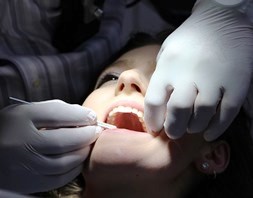Dental Hygiene Colleges
How to Choose the Right One Near Penn Pennsylvania
 Choosing the ideal dental hygienist school near Penn PA is an essential first step toward launching your new career in dentistry. But before you can make your selection, you must evaluate and compare your school options. There is far more to completing your due diligence than choosing the program with the lowest tuition or enrolling in the program that is closest to your residence. There are other significant factors to consider as well, for instance the program's accreditation and reputation. Dental hygienists typically earn an Associate Degree, as compared to a certificate usually earned by assistants, and can take anywhere from two to three years to accomplish. And consequently there is a higher cost associated with the longer training of a hygienist as compared to an assistant. We will talk about all of these factors and additional questions that you need to be asking the dental hygienist schools you are reviewing later in this article. But first, let's look at the roles of dental hygienists and the training programs provided.
Choosing the ideal dental hygienist school near Penn PA is an essential first step toward launching your new career in dentistry. But before you can make your selection, you must evaluate and compare your school options. There is far more to completing your due diligence than choosing the program with the lowest tuition or enrolling in the program that is closest to your residence. There are other significant factors to consider as well, for instance the program's accreditation and reputation. Dental hygienists typically earn an Associate Degree, as compared to a certificate usually earned by assistants, and can take anywhere from two to three years to accomplish. And consequently there is a higher cost associated with the longer training of a hygienist as compared to an assistant. We will talk about all of these factors and additional questions that you need to be asking the dental hygienist schools you are reviewing later in this article. But first, let's look at the roles of dental hygienists and the training programs provided.
It Takes Just a Few Minutes to Start Your Dental Hygienist Career Below
Dental Hygienist Job Description

When comparing the job of a dental assistant to that of a hygienist, the main difference is undoubtedly that the hygienist works more independently. Dental assistants work with and in support of the Penn PA dentists and the practice. Hygienists, while also supporting the practice, deal with the patients more on an individual basis. They are usually the first person a patient encounters when called from the waiting room. They examine every patient's teeth and gums and present their findings to the dentists. They also may perform basic procedures. Based on state law, a hygienist's duties can include:
- Removing tartar, stains and plaque
- Administering fluoride treatments
- Polishing teeth and applying sealants
- Teaching patients about oral care
- Taking and developing X-rays
- Removing sutures and applying fillings
Dental Hygienist Education Options
Due to the additional responsibility in contrast to an assistant, dental hygienists employed in Penn PA dental practices are often required to have an Associate Degree in dental hygiene rather than a certificate. These programs can require anywhere from 2 to as long as 3 years to complete and must be accredited by the CDA in virtually every state. They are offered in trade and technical schools as well as community colleges. And in addition to classroom studies learning the fundamentals of dental hygiene, there will be a clinical aspect to the training as well. A number of programs also offer internships with local dental practices or dentists.Dental Hygienist Online Classes
 Selecting an online dental hygienist program might be a good option for receiving your training. Just remember that the program will not be totally online, since there will be a clinical component to your training. But the remainder of your classes will be accessible by means of your desktop computer in the convenience of your Penn PA home or elsewhere on your laptop or tablet. For those continuing to work while attending college, online dental programs make education a lot more obtainable. Many may even have lower tuition rates than their traditional counterparts. And added expenses such as for commuting, books and school supplies may be lessened as well. The practical training can usually be performed at a community dental practice or in an on-campus lab. With both the clinical and online training, everything needed to get the proper education is furnished. If you have the discipline for this method of learning, you may find that enrolling in an dental hygienist online college is the right option for you.
Selecting an online dental hygienist program might be a good option for receiving your training. Just remember that the program will not be totally online, since there will be a clinical component to your training. But the remainder of your classes will be accessible by means of your desktop computer in the convenience of your Penn PA home or elsewhere on your laptop or tablet. For those continuing to work while attending college, online dental programs make education a lot more obtainable. Many may even have lower tuition rates than their traditional counterparts. And added expenses such as for commuting, books and school supplies may be lessened as well. The practical training can usually be performed at a community dental practice or in an on-campus lab. With both the clinical and online training, everything needed to get the proper education is furnished. If you have the discipline for this method of learning, you may find that enrolling in an dental hygienist online college is the right option for you.
Issues to Ask Dental Hygienist Programs
Now that you have decided to become a dental hygienist in Penn PA, you can begin the procedure of comparing schools and programs. As we discussed at the beginning of this article, a number of prospective students start by checking out the cost and the location of the schools. Maybe they look for some online alternatives as well. Even though these may be significant initial factors to consider, there are a few additional questions that you need to ask of the programs you are reviewing in order to reach an informed decision. To start that process, we have included a list of questions to help you with your evaluation and final selection of the ideal dental hygienist school for you.
Is the Dental School Accredited? There are many important reasons why you should only select an accredited dental hygienist school. If you are planning to become licensed or certified, then accreditation is a requirement in nearly all states. In order to take the National Board Dental Hygiene Examination, your dental school must be accredited by the Commission on Dental Accreditation (CDA). Accreditation also helps guarantee that the training you receive is comprehensive and of the highest quality. Penn PA employers typically prefer or require that job applicants are graduates of accredited colleges. And last, if you are requesting financial aid or a student loan, usually they are not offered for non-accredited schools.
Is Sufficient Clinical Training Provided? Practical or clinical training is an essential component of every dental training program. This applies for the online school options as well. Most dental hygienist programs have associations with regional dental practices and clinics that furnish practical training for their students. It's not only important that the program you enroll in offers adequate clinical hours but also provides them in the type of practice that you subsequently want to work in. For example, if you are interested in a career in pediatric dentistry, confirm that the school you select offers clinical rotation in a local Penn PA dental practice that specializes in dental care for children.
Is There an Internship Program? Ask if the dental programs you are looking at sponsor internship programs. Internships are undoubtedly the most effective way to get hands-on, clinical experience in a professional dental practice. They help students to transition from the theoretical to the practical. They can also help students build working relationships in the professional dental community. And they are attractive on resumes as well.
Is Job Placement Support Furnished? Many students that have graduated from dental hygienist programs require help landing their first job. Check if the colleges you are looking at have job placement programs, and what their job placement rates are. Colleges with high job placement rates are likely to have good reputations within the Penn PA dental profession as well as large networks of contacts where they can place their students for internships or employment.
Are the Classes Smaller? Find out from the colleges you are evaluating how large typically their classes are. The smaller classes tend to offer a more intimate environment for training where students have greater access to the instructors. Conversely, bigger classes often are impersonal and offer little individualized instruction. If practical, find out if you can monitor a couple of classes at the Penn PA dental hygienist school that you are most interested in in order to witness first hand the amount of interaction between teachers and students before enrolling.
What is the Overall Cost of the Program? Dental hygiene programs can fluctuate in cost dependent on the length of the program and the volume of clinical training provided. Other variables, for example the reputations of the schools and whether they are public or private also come into play. But besides the tuition there are other substantial costs which can add up. They can include expenses for such things as textbooks and commuting as well as school materials, equipment and supplies. So when examining the cost of colleges, don't forget to add all of the costs associated with your education. The majority of schools have financial aid departments, so be sure to check out what is offered as far as grants, loans and scholarships in the Penn PA area.
Are the Classes Accessible? Before selecting a dental hygienist school, you need to confirm that the assistant or hygienist program offers classes that fit your schedule. This is particularly true if you continue working while acquiring your education and have to attend classes near Penn PA in the evenings or on weekends. And even if you choose an online school, you will still have to schedule your practical training classes. Also, while addressing your concerns, ask what the make-up procedure is if you should need to miss any classes due to illness, work or family responsibilities.
Find Out More About Studying to Become a Dental Hygienist in Penn
Choose the Right Penn Dental Hygienist School
Picking the right dental hygienist course is essential if you want to take the National Board Dental Hygiene examination or, if mandated in your state, become licensed. As we have covered, there are many alternatives available to receive your training and it takes a fairly short amount of time to become a dental hygienist. You can acquire your formal training through dental hygienist programs at community colleges, vocational schools, technical institutes and trade schools. Graduates of these schools usually receive an Associate Degree. Dental Hygienists normally require roughly two years of studies prior to entering the job market. When pursuing a degree you can choose to go to classes online or on-campus. Whichever mode of training you decide to pursue, by asking the questions provided in this article you will be in a better position to make the right choice. And as a result, you will be ready to begin your journey toward becoming a dental hygienist in Penn Pennsylvania.
Penn How To Become A Dental Hygienist | Penn Dental Hygienist Courses
